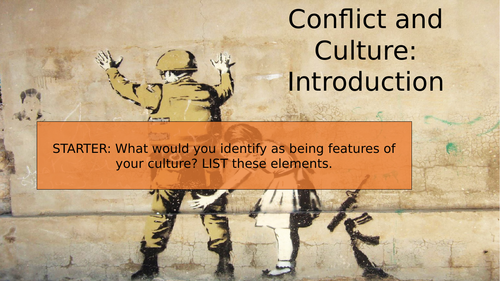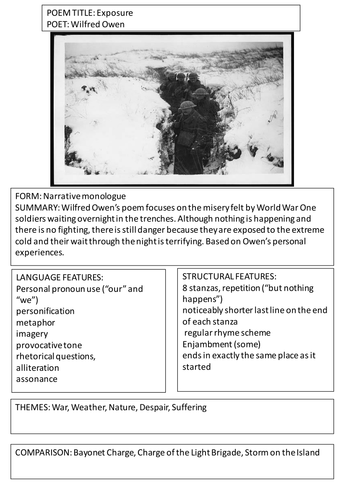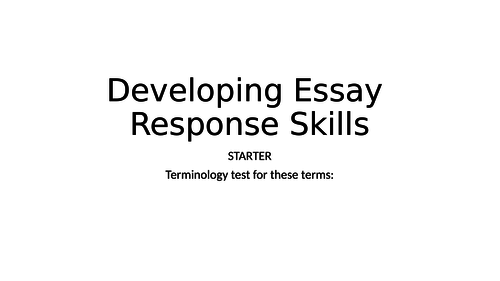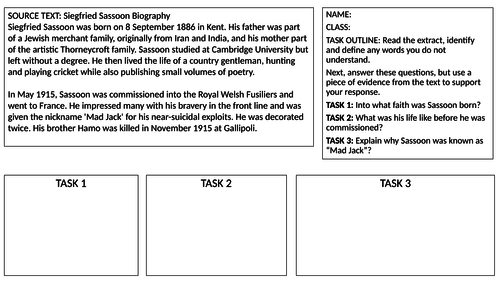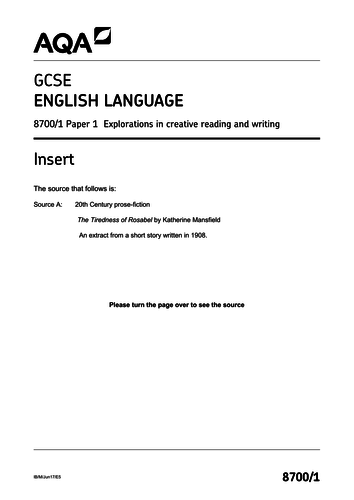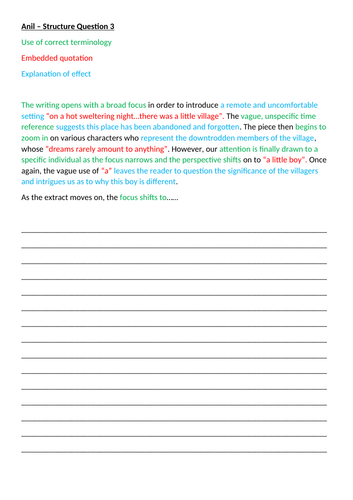
228Uploads
568k+Views
1405k+Downloads
English language arts
Sale

KS3: Conflict and Culture Poetry - a stimulus for Creative Writing
I've had a lot of fun teaching these lessons. Essentially, the idea is you spend a lesson exploring a poem and then a creative angle has been drawn from the text to inform the creative writing lesson that follows. Each of the creative writing lessons assumes a two hour window. A simple scheme, but I've found it to be rather effective.
Bundle Sale

AQA English Literature Paper 2 Bundle: Modern Texts and Poetry (version 2)
Three complete units of work that go through the teaching of An Inspector Calls, all 15 of the Conflict and Power poems AND a selection of Unseen Poems. I've included a version of the poetry anthology I've created that lends itself to annotating and revising better than the AQA version too - bit of a beast that. Also, you will find attached a spreadsheet that allows you to track the scores for all of these components.
Sale

AQA Power and Conflict Poetry Revision Cards
A series of revision cards designed for students to use independently to aid with the revision process. I will add to these as I go.
Sale

AQA English Language Paper 1 Section A Talking Mock Exam
A talking mock lesson (two hours long) with strategies on the slides for the students to refer to and time limits identified. The idea is that prior to each question, you are to remind students of how to answer the question. The expectation is that the class will have attempted a Paper 1 Section A beforehand - this is the lesson where they try and beat their previous scores. A quick word of warning: the exam paper is available elsewhere in my shop.
Sale

AQA English Literature - A Christmas Carol: Complete Unit of Work
The lessons are designed to tie in specifically with the Scholastic Classics version of the text OR the Collins Classroom Classics version, but it wouldn’t take too much to use this with any version to be honest.
Visually, the powerpoints are designed to be eye-catching. Each one is loaded with links to videos, layered with animations and suitably spooky xmas music.
The lessons are ordered via number for your convenience. There is a specific focus on each of the GCSE Assessment Focuses, starting with AO3 (It makes sense, to me at least, to contextualise the story prior to reading it).
The stave lessons each contain definitions of the archaic words (though there is a definite backing off with this the further in you get: as the students get more familiar with the language, they’ll need less prompting with decoding it), as well as a particular focus on key quotations. There are comprehension questions layered throughout, and the first THREE of the stave lessons have an ending task that links to a type of question found in AQA English Language Paper 1 Section A - my class had previously focused on this unit and it made sense to me to keep these skills “hot” so to speak.
The AO specific lessons tie in with the Assessment Objectives for the English Literature course. The AO1 and AO2 lessons assume that the students have read the entire text.
Finally, the theme lessons build towards the students sitting a GCSE Literature style assessment.
I have sourced a lot of ideas from the following pdf file - I wouldn’t feel comfortable trying to pass these ideas off as my own; I include the link so that any person might have the benefit of this resource without having to pay for mine:
http://drbacchus.com/files/christmas_carol/glossary.pdf
There’s about 30+ hours worth of teaching materials in here; enjoy!
Sale

AQA English Language and Literature: Developing essay response skills to the Paris Anthology section
This is my attempt to engage and develop my Year 12s academic voices in their Paris Anthology related essay responses. The main issue my class had seemed to focus upon when and where to start. What I do is show them how they can place a particular emphasis on one of several potential areas of focus initially. I show them how they could use Mode, Audience, Purpose, each of Grice’s Maxims and each of the different levels of language as a starting point for an analytical response. The attached word document appears to be an “essay”.It isn’t. It’s the collected starting points placed in one document so that the students can focus more on the “how you do it” instead of trying to copy down the best bits.
It worked reasonably well and is suited for a class with similar needs. Hope you find this useful.
Sale

AQA English Language and Literature: Developing Essay Writing Skills for the Heaney section
I used a similar approach with the Paris Anthology section and my class found it to be very useful. The issue they were having focused on incorporating enough AO1 terminology appropriately. This lesson is designed to talk them through an approach to an essay question, starting with the poetic voice, moving on to selecting relevant areas and then placing each level of language as a different starting point before exploring ideas across the language levels. It seemed to work…
Hope others find this useful as a starting point.
Sale

AQA English Language PAPER 1 Creative Writing Tasks/Resources
Three slides on a power point that can easily be printed out and handed out as a task. Each slide gets progressively more complex. Each slide contains a choice of two tasks (one descriptive and one relating to the writing of a narrative), a punctuation related challenge, a content challenge and an organisational challenge.
Ran it with my year 11s yesterday and they found it very useful.
Oh yes! I have intentionally put one spelling/punctuation mistake on each slide with the idea that I award a housepoint to the first student that identified it. You’re welcome!
Sale

AQA English Language Paper 1 Resources - based upon 100% Perfect Girl
A few things first: the mock exam can be found elsewhere on in my resources and I base the lessons off a similar series of lessons focused on Anil. The difference here is that these lessons are very much targeting higher ability students - all of the success criteria draws from the top end of the mark criteria.
I found this series of lessons to be really useful as a way of establishing the skills required to answer each of the Section A questions. The lessons focus less on exam strategy and more on understanding what is required in relation to each question. The kids found it useful.
Sale

KS3: SPaG Understanding a Text Lessons (Using Michael Grant's "Gone" series as a stimulus)
SPAG lessons can get a little flat at times. These are the worksheets I’ve designed to use with my own SPAG group. It is designed to be taught in tandem with a Dystopian Fiction SoW that ends with a reading assessment. Specifically, these lessons focus on an extract taken from Michael Grant’s “Gone” - all extracts taken from the first chapter. The aim is to develop an increased understanding of each text through the asking of more and more complex questions. The tasks can be sat as part of a lesson (I reckon they’ll take most groups between 10-30 minutes depending on the groups setting), or make ideal homework and/or extension tasks.
At the moment, the resources are set up to be taught to lower set year 7 students. But, it won’t be too hard to change the tasks to more suitable ones for any set.
UPDATE: I’ve included some versions that are more suited to be printed out. They have some basic RAG feedback grids on the back with some generic targets.
Sale

AQA A-Level English Language and Literature: The Tollund Man
A lesson I put together to assist with the teaching of The Tollund Man. Pay attention to the notes element of the power point. I source a lot of information from a lot of different places here.
Also, the essay questions at the end tee up nicely into a lesson focusing on comparison.
Sale

KS3: SPaG Understanding a Text Lessons (Focusing on WW1 poets and their background)
This uses a format I’ve used elsewhere. The lessons are designed to support the teaching of conflict poetry from WW1. The goal is that the students sharpen their reading skills and get a boost in their English lessons where the poet is the subject of focus.
Sale

Punctuation vs Teachers: Tracking punctuation skill progress and making it fun(ish...)
A series of activities that are designed to be taught over time. There is a bit of initial leg-work to do in setting up the spreadsheet and, truth be told, I’ve had more success using this with smaller classes than with larger ones - the volume of specific data generated gets unwieldy with the larger groups.
So, I’ve divided punctuation up into three groups - BASIC, MID-RANGE and ADVANCED. The idea is that you teach/go over/re-demonstrate the type a type of punctuation. Then, the students are given ten minutes to write where they focus on using that type of punctuation. Each punctuation type has a points value, and the goal is to “defeat” a possessed teacher by using that type of punctuation. The powerpoint presentations each show a teacher (or a combination of teachers) making their way across the screen over the course of ten minutes. There’s the option of spooky orchestral music too.
There are specific work sheets that each student will need - each work sheet contains the points value of each punctuation type and a grid where you can wither self/peer/teacher assess depending on how you want to set the lesson up.
As the class progresses, so to does the complexity of the task. Each new level incorporates a new type of punctuation OR (more importantly) a new combination of focuses. For example, level 3 requires students to use BASIC and MID-RANGE punctuation to defeat two teachers.
What I found useful was the specific nature of the feedback I got: I could see quite clearly which punctuation types were defeating each student and which punctuation type was an issue for the class as a whole. And, if the class lost (which they did on more than one occasion) then they retried the level the following week.
We used this in SPAG lessons in combination with some other elements - it can easily be made into a whole lesson.
A useful little tool…
Bundle Sale

AQA GCSE Curriculum
Every scheme of work that I’ve made that could be used to teach AQA English Language and AQA English Literature
Sale

AQA English Language Paper 1: The Tiredness of Rosabel exam deconstruction
A lesson designed to be taught AFTER the class has sat a mock exam. However, with very little modifcation this can become a walking-talking mock exam, or a peer/self assessment based lesson.
The powerpoint contains model material and an indicator as to the quality of the model material. My class found this lesson to be very useful.
Additionally, the insert is available for free should you wish to download it for yourself. I include the link below:
https://linwood.bournemouth.sch.uk/summerwood/files/2017/12/8700_1-INS-EnglishLanguage-G-6Jun17-AM.pdf
Sale

AQA English Language Paper 1: The Mill
A PowerPoint designed to be used after students have sat the Section A of the AQA English Language Paper 1 for June 2019. It wouldn’t take much altering to be used as a mock exam itself. The slides are set up to show the model answers from the mark scheme so that students can peer/self assess and give actions and feedback.
Bundle Sale

AQA English Language P1 and P2 Deconstruction Pack
A collection of resources that can be used to either go through specific English Language papers, or set up the students for a mock exam.
Sale

AQA: Year 9 Intro to English Language Paper 1 + Workbook
A variation on a selection of lessons that I sell elsewhere. Here, the center piece is a 26 page printable workbook that runs in tandem with the power-point lessons - ideal for a Summer Term 2 unit of work where you are reluctant to give the students a new work book, and working on paper is problematic.
The text is Anil (from the old Sunlight on the Grass Anthology) and there is about 12 lessons worth of material here.

